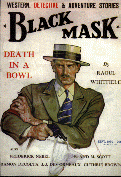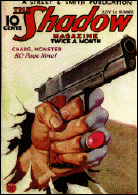American
Mystery
Stories: 2002
James Ellroy, Editor
(Houghton Mifflin)

"Name it."
"Rustlin'."
Elliot worked his mouth a bit. James could see the idea appealed to him. Elliot liked to think of himself as a modern cowboy. "How many head?"
"One."
"One? Hell, that ain't much rustlin'."
It's a lowly mule, but they know that if they steal it, Taylor will take it off their hands. He runs a fencing operation outside of town, which includes smashing old stolen cars:
Taylor's place was a kind of ranch and junkyard. There were all manner of cars damaged or made thin by the car smasher that Taylor rode with great enthusiasm, wearing a gimme cap with the brim pushed up and his mouth hanging open as if to receive something spoon-fed by the caretaker.
Problem is, when they get inside Taylor's door, there are three rather large men, including one named "Viceroy" who thinks Taylor tried to cheat him on a deal. The three of them have been busy skinning him alive (skinning him alive!) to get him to tell where's the stash. But Taylor dies without spilling the beans, so they go to work on his wife.
Once Elliot and James figure out what's going on, they start their Taylor mantra: "He ain't no friend of ours. We just come to do business, and if he ain't here to do business, you boys got our blessing. And we'll just leave and not say a word." But too late.
"Sit down on the floor there, next to the wall, away from the door," Viceroy said, and scratched the side of his cheek with the barrel of the automatic.
Great plot, great economy of style, and great dialogue.
Richard Dow is on the federal protection program, which means he lives in a village in far-off Vermont, has a new name, and has to keep his nose clean.
His son is in the Little League, along with a dumpy kid named Leo Winn. His father, George, knocks Leo around when he doesn't get any hits or drops a ball. Richard --- murderer of eleven men in his previous life --- doesn't like George beating up on Leon, so tells him to lighten up. Beefy George goes after Richard --- who becomes a Gandhi as he's being knocked about (he has to mind his manners or he'll be banished to a dust farm in Montana). Nice tension, nice telling, and in the end, nice resolution.
 Whenever they stick "The Best" in the title, our response is usually "Sez Who?" We like the two above --- "The Mule Rustlers" by Joe. R. Lansdale and "A Family Game" by Brendan Dubois --- but the majority of the other twenty are either weak on plot, too filled with street-thug language, or totally absent in the balance and structure department.
Whenever they stick "The Best" in the title, our response is usually "Sez Who?" We like the two above --- "The Mule Rustlers" by Joe. R. Lansdale and "A Family Game" by Brendan Dubois --- but the majority of the other twenty are either weak on plot, too filled with street-thug language, or totally absent in the balance and structure department.
David Gates in "The Blue Mirror" doesn't know how to crank up a tale (one has to be quick in this genre) and Joe Gore's "Inscrutable" is just too busy with facts and overwrought language. They might well remember that a good short story is like a good loving: there must be an element of leisure, but if it runs too slow, the participants may nod off. And if it is too quick, who's going to come away satisfied?
Then there's the matter of balance. With the 5,000 - 10,000 words, there must be a proper beginning, a roof-top middle, and an appropriate stop. If a writer falls in love with any one of these three, the whole kaboodle is shot.
Daniel Waterman wants to tell us about a no-good brother who has become a Lepidopterist, but the story founders on a slow beginning, too many butterflies (Red Admiral, Peking Cabbage), not enough lovable (or at least wonderfully horrible) characters.
We'd give this whole collection a C+ --- meaning that less than half the twenty are worth your trouble. One surprise: Joyce Carol Oates who, in the past, we have found to be no more nor less than a master word-